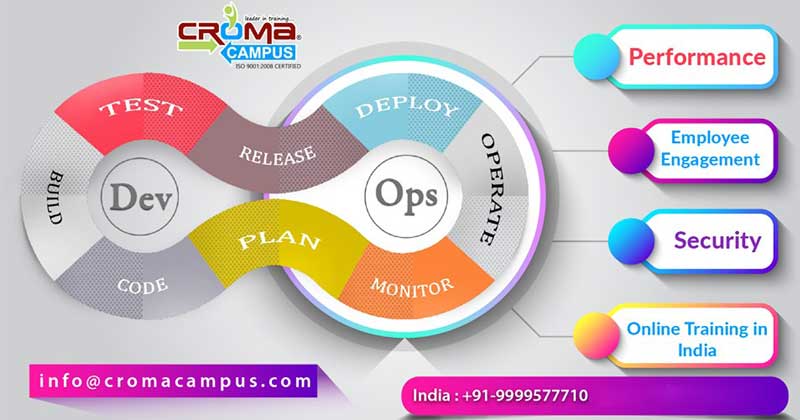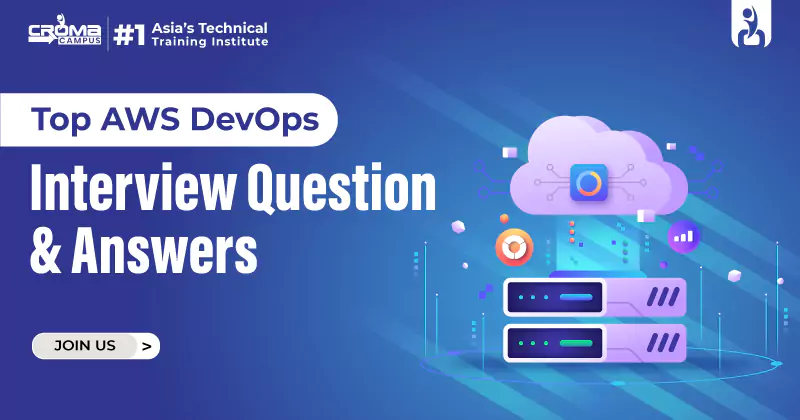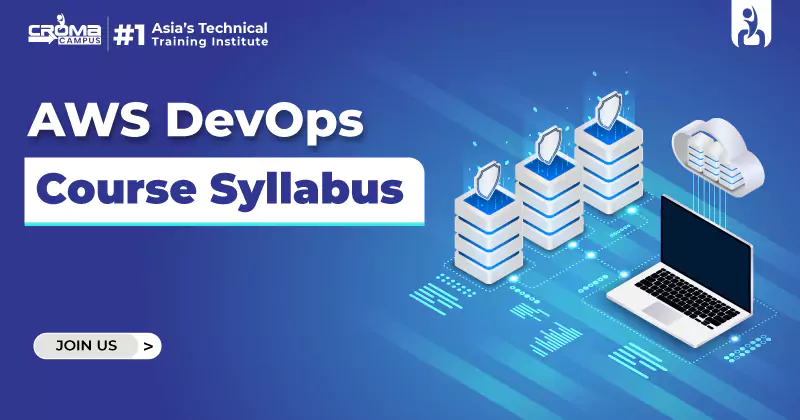What Is DevOps And Why It Is Used?
5 out of 5 based on 843 votesLast updated on 16th Dec 2020 6.9K Views
- Bookmark

The products faster than that of the traditional software development and management processes. well, anyone can learn and understand it through the DevOps.

Software development and IT operations are the main spine or support of any organization. To manage it, it is very important for any organization to combine these tools so as to get proper management and the work process. Well, today as the organization is looking for the best source through which they can shorten their development life cycle and in that the DevOps is the best tool that supports and helps in increasing the organization's ability to develop and operate the application with effective results. So, here is a complete guide to learn and understand the work with DevOps and all the tools associated with it.
Croma Campus Pvt Ltd on Twitter: "DevOps Online #Training Courses is now the obvious first choice of individuals and professionals looking to make a satisfying career in the #DevOps knowledge field. To
What is DevOps?
To increase the organization's ability to deliver the applications and service in a quick way. Therefore, DevOps or Development and Operations is a perfect combination of tools, practices, and philosophies that helps in doing so. It helps in improving and building the products faster than that of the traditional software development and management processes. well, anyone can learn and understand it through the DevOps Training Institute in Noida from the institute.
Why DevOps is used?
The DevOps provide assistance with the automated and integration of the relation between the IT teams and software development. It helps with the testing, creating, and building the software faster and in a more reliable way. The main reason to use DevOps by building the communication and collaboration to build, plan, operate, monitor, feedback, and continuous integration and deployment for the processes between the development and operation.
History of DevOps
It was a time in 2007 and 2008 when the IT operations and development were facing an aggressive level of dysfunction that raised concern in the industry. So, to cure such concern they moved against the traditional software and development model as the developers and the IT professionals have a different department, operations, KPIs and also were on the different floors of the organization. With this, the organization was facing poor results, unsatisfied customers. Long working hours and screwed up releases. All this was finally cured by DevOps.
Types of DevOps Methods
There are few DevOps methods that organizations employ to power up their product releases and improve development. Well, the most popular among them are Scrum, Agile, and Kanban. Let’s know more about them.
Scrum – it is a process that helps the teams to work together to increase development and Quality assurance. This method helps in managing the key workflow and particular roles such as sprints, daily scrum, designated roles, and time boxes.
Agile – it is a constant and methodological approach that focuses on customer feedback, rapid releases, and collaboration. It generally focuses on the constant changes. It mainly focuses on effectively handling the developers and development cycles.
Kanban – it is a method that helps the team to limit the amount of work and ensuring the things to get done without facing any issues. It is actually a framework that is used with DevOps and Agile software development. It processes real-time communication and brings transparency to work.
Benefits of Incorporating the DevOps in Any Organization
Here are some of the primary organizational benefits that one can gain by employing DevOps practices.
Batch size
Here the small batch size defines the simpler, easy to navigate, and low risk involving batches including better testing techniques. in the organization, the repeated integration and product delivery carry a lot of importance to achieve the desired goals and practices of DevOps that allow rapid cycle and growth in the delivery.
Dedicated team members
Well, earlier in traditional SDLC the employee needs to explain all thing to the project manager to granting the permissions needed, this process was time taking and with the help of DevOps, one can make the right decisions at right time to deploy at the right moment.
Great communication and collaborative work process
DevOps means a good cultural shift, one that not only removes barriers to communication but also allows employees to simply collaborate and share resources. Besides, the strongest DevOps players are those that understand the worth of teamwork. To win over using the DevOps operations, all stakeholders must be connected. Coordinating varying teams so that they could all get cooperative and enable trust and collaboration.
Eliminate the errors and less time for the recovery
DevOps practices are particularly well-suited for minimizing the impact of the bottlenecks, rollbacks, and deployment failures on efficiency. But when errors are encountered anyway, less time is required to live through them. Faster error detection provides an efficient circuit between the operations and developers on one hand and customers on the opposite hand.
Effective approach
Automation is at the core of the DevOps culture because it helps make sure that all other key principles of DevOps are observed, too. Traditionally, a development environment is made from scratch, but a DevOps environment is created using automated processes for it to be able to handle the rise of the merchandise, varying workloads, and changing needs over time
Tools of DevOps
There are many different tools of DevOps that provide the correct approach in a different department of the organization. These tools can be learned by DevOps Online Training as it is the best way to understand and gran hand-on experience on them. Below all the tools are characterized according to their needs, so let’s explore them.
DevOps Automation Tools
Puppet – it is a paid as well as free open-source version. It is a perfect automation tool that helps in providing the automation for the complicated manually assisted task it simplifies those tasks by picking out the complicated configuration details from different platforms of operating system and technology.
Docker – it is very important for DevOps operations. It is utilized for faster development to develop its own image and modify the already developed according to the need.it helps in integrating to build robust images using a million lines of puppet coding.
Jenkins – it basically means automating the regular tasks. It enables CI/CD of coding language for any combination and provides source code repositories integrating with the piping system.
DevOps is an Infrastructure as Code Tools
Terraform – it is an infrastructure planning tool that helps in maintaining the state of infrastructure incorporating the state files. It helps the public and private cloud infrastructure structuring.
Ansible – Configuration modules known as Playbooks are used as agent-less configuration management and orchestration tool. these playbooks are easy to write and support cloud structure and are written in YAML format.
Chef – it is a ruby-based configuration management tool that utilizes cookbooks in which infrastructure is written or coded in a particular domain language with a limited amount of programming.
DevOps Continuous Integration or Deployment Tool
Vagrant – it is a virtual machine configuring tool used for the developer environment. It includes plugins that help in providing complete support in cloud provisioning and cloud management tools and dockers.
Docker – process-level virtualization in a concept on which the docker work on. It creates a confined environment for container applications.
DevOps Configuration or Secret Managing Tool
Consul – it is a widely available, open-source tool used mainly for the service discovery requirement, it is a perfect fit to store and retrieve the configuration in real-time.
ETCD – it is an open-source key-value store that is used in Kubernetes that helps in storing the various operations and management conditions.
Vault – it is also an open-source tool that helps in storing and fetching confidential data that stores the secret key and provides an option to have encrypted data.
DevOps Monitoring Tools
Prometheus & alert management – it is open-source monitoring tools build to provide assistance to modern app monitoring. It has an alert monitor that assists in taking care of the mechanism to monitor the metrics.
New Relic – Being a SaaS app it helps in monitoring Ruby, Java, NodeJS and PHP, and many other languages to provide insight with real-time performance monitoring.
Sensu – it is used for cloud computing and is easy to deploy through the Chef and puppet tools being an open-source monitoring tool.
Data Dog – it is a SaaS application and server monitoring solution that keeps on monitoring the Docker and other related tools
DevOps Tool for Measurement
Spluk – it helps in monitoring and exploring the data generated through the machine.it helps in indexing the data making it unique from the other used DevOps tools with an effective information sharing platform.
Graphite – it converts the machine-generated data into a visual format such as graphical representation defining the on-demand graphs. It easily renders the chunks of data into the visual format such as graphs and dashboards so that further it can be deployed onto any other webpages or applications.
DevOps Tools for Continuous Testing
Selenium – it is a very popular tool that is used for testing the application based on any operating system such as Windows, macOS, Linux) it easily handles and supports multiple languages and provides a robot framework for continued testing.
Test sigma – it is a cloud-based automation testing tool that provides complete support in testing the mobile or web application based on the operating system Android and iOS. Understanding is easy as it is written in simple English and required no programming to gain control.
Well after reading all these tools you must have understood the DevOps functionality in any organization and how it is helping the development and IT operations so accurately. So, it's time when you should upgrade your career and start with the best upgrade that is required to engage your future with DevOps working in the eminent organization.
Subscribe For Free Demo
Free Demo for Corporate & Online Trainings.
Your email address will not be published. Required fields are marked *





















 Master in Cloud Computing Training
Master in Cloud Computing Training